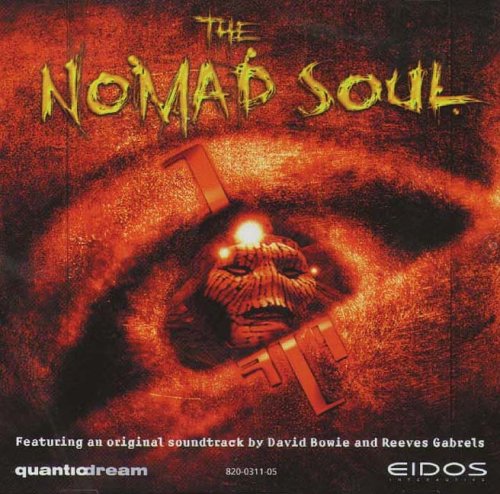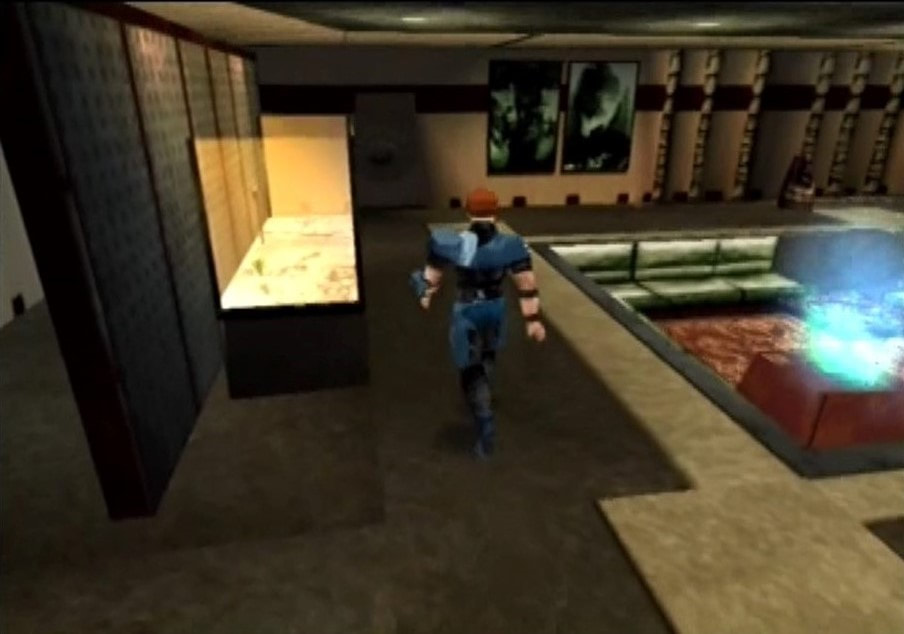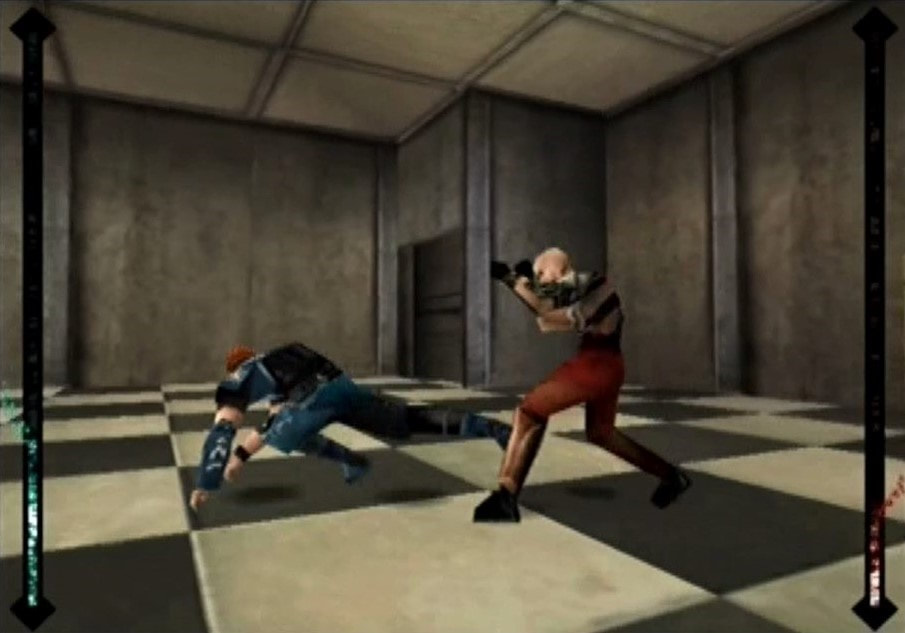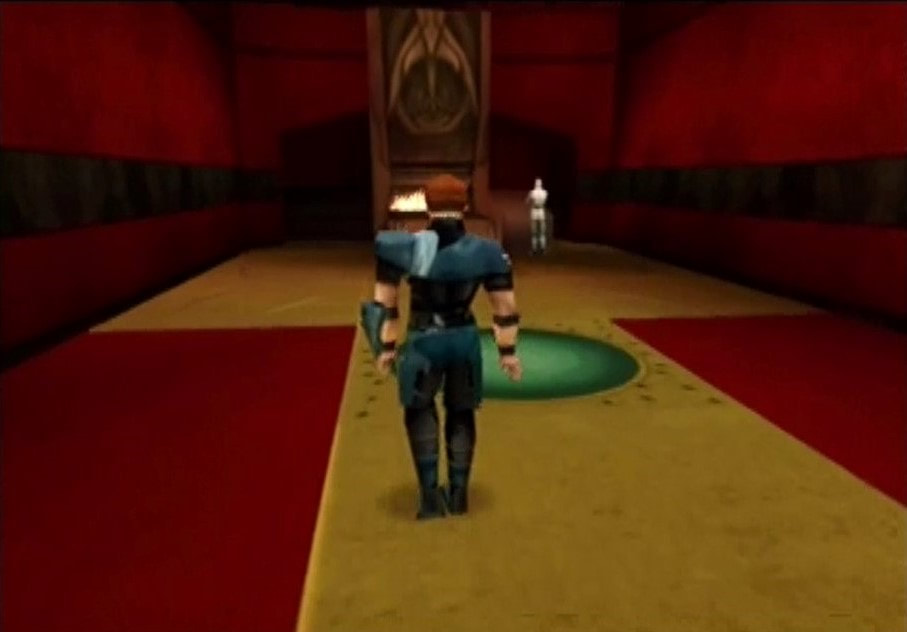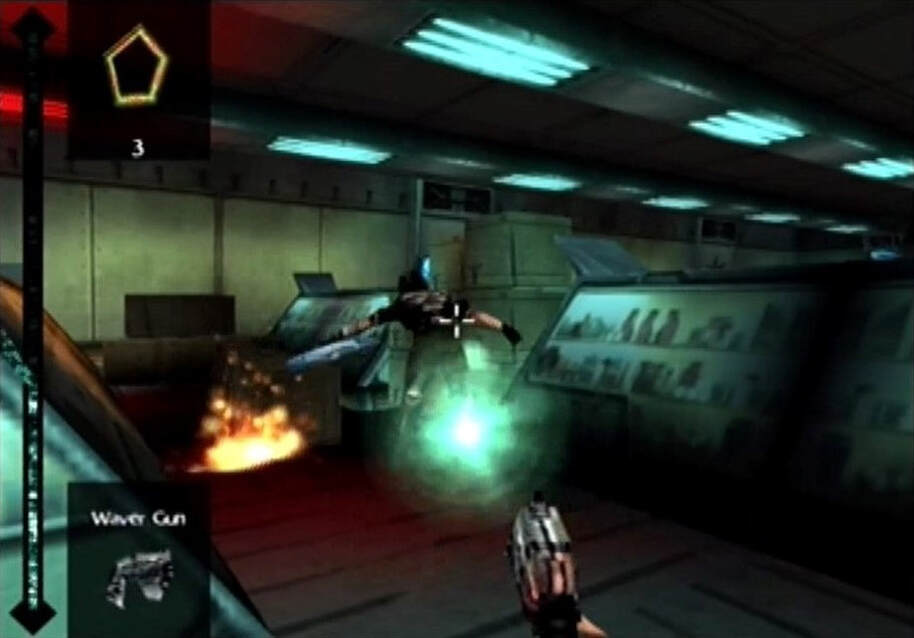THE NOMAD SOUL (DC)
Featuring an ambitious mix of genres, settings and thematic elements, The Nomad Soul is a game which appears both brave and daring. Marking the gaming debut from French development studio Quantic Dream, and bolstered by heavy involvement from musician David Bowie, a hit was on the cards, so long as it could group all of its disparate parts together into a cohesive whole. Unfortunately, its ambitions crumble under the weight of technical woes, flat storytelling and sluggish pacing, meaning only the most patient of gamers will salvage something from this hybrid title.
Set in the city of Omikron, The Nomad Soul begins in bizarre fashion, as the supposed hero of the piece, Omikron Police Officer Kay’l, tells the player directly that he is loaning his body to us in order to solve a series of serial killings around the Anekbah sector. This breaking of the fourth-wall is one of the tamer elements you’ll see in The Nomad Soul, as a labyrinthine plot featuring numerous characters can prove tricky to keep up with. Unfortunately, it is less complex and more convoluted. You’ll likely lose interest long before the game’s completion, with painfully lengthy dialogues that are often so odd, you'll feel the need for a translator. The protagonist doesn’t help much either due to, as you’ll soon find out, his limited role in the story.
Featuring an ambitious mix of genres, settings and thematic elements, The Nomad Soul is a game which appears both brave and daring. Marking the gaming debut from French development studio Quantic Dream, and bolstered by heavy involvement from musician David Bowie, a hit was on the cards, so long as it could group all of its disparate parts together into a cohesive whole. Unfortunately, its ambitions crumble under the weight of technical woes, flat storytelling and sluggish pacing, meaning only the most patient of gamers will salvage something from this hybrid title.
Set in the city of Omikron, The Nomad Soul begins in bizarre fashion, as the supposed hero of the piece, Omikron Police Officer Kay’l, tells the player directly that he is loaning his body to us in order to solve a series of serial killings around the Anekbah sector. This breaking of the fourth-wall is one of the tamer elements you’ll see in The Nomad Soul, as a labyrinthine plot featuring numerous characters can prove tricky to keep up with. Unfortunately, it is less complex and more convoluted. You’ll likely lose interest long before the game’s completion, with painfully lengthy dialogues that are often so odd, you'll feel the need for a translator. The protagonist doesn’t help much either due to, as you’ll soon find out, his limited role in the story.
Full of interesting ideas, The Nomad Soul sadly isn't well optimised to the Dreamcast hardware.
You see, as the titular soul of the piece, Omikron’s inhabitants can become your protagonist at any second. Death in this game is almost never permanent as, aside from a few select situations, you’ll often re-incarnate as another character. Some light RPG elements come into play here, as stats built up will all reset upon revival. It sounds like a neat concept in theory, placing the player at the forefront of the experience rather than any particular hero. But it also leads to a bit of a disconnect, as several instances see you forced to swap into a personality-less nobody, with only your dialogue choices giving them any character. Even then, it usually resorts to banal questions which you yourself would likely ask, rather than creating a persona. It can also be frustrating to lose your accrued stats due to the story dictating who you are and, unceremoniously, killing you off.
Quantic Dream have attempted to incorporate a variety of gameplay styles. General exploration follows a traditional adventure-game format, as you guide your avatar through the world while interacting with objects, solving a myriad of puzzles and exploring the Omikron world. Outside of this, two styles of combat add action to the game. One is a bevy of first-person shooter segments, tasking you with gunning down anyone shooting at you. You can acquire more guns, find healing items in the field and strafe both left and right. When it’s a more personal affair, 1v1 fighting occurs. You can learn and perform a variety of combos, dodges and manoeuvres, with stats improving as you specialise in different moves. This is a very disparate spread of gameplay styles, and though it may seem strange, sufficiently polished gameplay could have kept it afloat.
Quantic Dream have attempted to incorporate a variety of gameplay styles. General exploration follows a traditional adventure-game format, as you guide your avatar through the world while interacting with objects, solving a myriad of puzzles and exploring the Omikron world. Outside of this, two styles of combat add action to the game. One is a bevy of first-person shooter segments, tasking you with gunning down anyone shooting at you. You can acquire more guns, find healing items in the field and strafe both left and right. When it’s a more personal affair, 1v1 fighting occurs. You can learn and perform a variety of combos, dodges and manoeuvres, with stats improving as you specialise in different moves. This is a very disparate spread of gameplay styles, and though it may seem strange, sufficiently polished gameplay could have kept it afloat.
Unfortunately, this is far from the case. Everything is tainted with control issues which, perhaps, is due to the transition from PC to console. Shooting feels completely wonky, seeing you constantly having to swap between D-Pad movement and analogue stick aiming which – when next to each other on the Dreamcast’s controller – is awkward. Fighting seems deep, but can feel punishing unless you use obvious, and disappointing, exploits. Both suffer from poor A.I., with shooting segments plagued with robotic dummies and fighting also prone to dumb moments. Even the adventuring feels sluggish, with tank controls and static cameras sometimes obscuring key items, a limited inventory system which makes juggling items a chore without constantly visiting Sneak computers to store them, and some seriously oddball puzzles which require luck more than intelligence.
It’s a shame because there is a lot to dive into here. The game lasts close to 20 hours, and although maybe not compelling all the way through, it also features side missions aplenty. The districts of Omikron feel alive and each with their own personality, from the grungy Anekbah to the desert-esque Jaunpur. But some of this world-building is undone by technical issues which dog the game at every turn. Loading stutters are almost constant, freezing the game for seconds while a new area buffs in. Characters range from detailed and expressive to ugly and stiff. The frame rate swings wildly between smooth and choppy in open areas, and despite releasing some months after the PC version, it’s clear this was not well-optimised for SEGA’s console.
It’s a shame because there is a lot to dive into here. The game lasts close to 20 hours, and although maybe not compelling all the way through, it also features side missions aplenty. The districts of Omikron feel alive and each with their own personality, from the grungy Anekbah to the desert-esque Jaunpur. But some of this world-building is undone by technical issues which dog the game at every turn. Loading stutters are almost constant, freezing the game for seconds while a new area buffs in. Characters range from detailed and expressive to ugly and stiff. The frame rate swings wildly between smooth and choppy in open areas, and despite releasing some months after the PC version, it’s clear this was not well-optimised for SEGA’s console.
The Nomad Soul tries it's hand at a diverse range of play styles, but lacks polish.
Perhaps the highlight, brief as it is, comes from David Bowie’s involvement. Not only does he lend his vocal talents to voice Boz, an all-knowing computer system, he and Reeves Gabriels devised an original soundtrack which, to be frank, is great. A myriad of tracks stand out, adding thematic overtones to each distinct location while also providing moments of suspense, intensity and danger. It’s a shame that the soundtrack is often drowned out by imbalanced audio mixing, causing it to be buried under scratchy recorded dialogue and overly loud sound effects.
The Nomad Soul deserves praise for its ambitious melding of ideas, but at the end of the day, they don’t come together to form a cohesive whole. Whether it’s the adventure elements, the shooting galleries or the hand-to-hand combat, none of it feels refined or well thought out. Despite great world-building and Bowie’s excellent contributions to the audio, it’s buried under tedium and boredom. It’s one thing to prioritise an excellent narrative, but Nomad Soul’s convoluted and borderline-pretentious storytelling fails to engross. Unless you’re a David Bowie nut, this one is probably best left as a curiosity.
The Nomad Soul deserves praise for its ambitious melding of ideas, but at the end of the day, they don’t come together to form a cohesive whole. Whether it’s the adventure elements, the shooting galleries or the hand-to-hand combat, none of it feels refined or well thought out. Despite great world-building and Bowie’s excellent contributions to the audio, it’s buried under tedium and boredom. It’s one thing to prioritise an excellent narrative, but Nomad Soul’s convoluted and borderline-pretentious storytelling fails to engross. Unless you’re a David Bowie nut, this one is probably best left as a curiosity.
|
|
VERDICT
"The Nomad Soul deserves praise for its ambitious melding of ideas, but ultimately, they don’t come together. Unless you’re a David Bowie nut, this one is probably best left as a curiosity." OVERALL: 4/10 |
